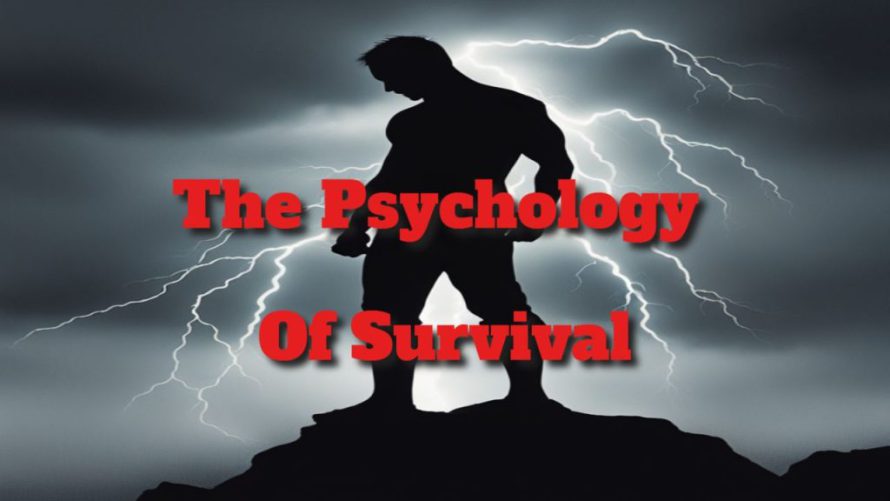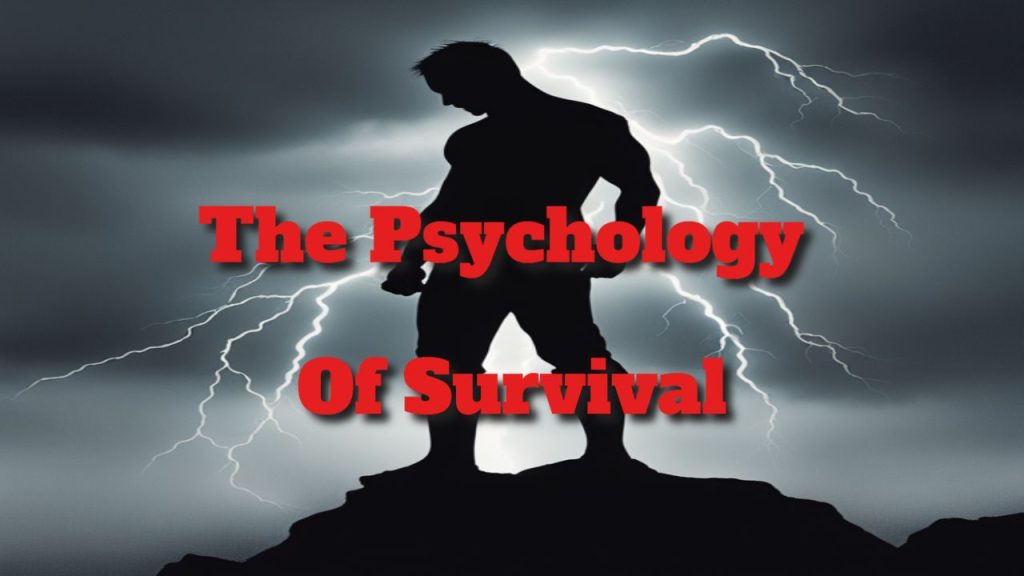Discover Powerful Insights into Survival Psychology for High-Stress Scenarios
The saying “desperate times call for desperate measures” aptly encapsulates the essence of survival, particularly when delving into the intricacies of survival psychology. In the face of extreme peril, the human psyche undergoes a remarkable transformation, drawing on hidden reserves of strength and resilience that often lie beneath the surface. This transformation is not merely a reaction but a full-scale mobilization of mental and emotional resources, showcasing the profound capabilities of the human mind.
When we confront life-threatening situations, a myriad of psychological processes unfold. What exactly transpires in our minds when every moment is critical? How do we make life-altering decisions under pressure? Additionally, how does our intrinsic psychological framework shape our ability to endure, adapt, and ultimately thrive in chaotic environments? These questions are central to understanding the dynamics of survival psychology, which we will explore in depth throughout this article. By illuminating the key elements that underpin our ability to persevere in the face of adversity, we can gain valuable insights into our own capabilities and responses.
Join us on this journey into the fascinating realm of survival psychology, where we will unpack its complexities and reveal the essential factors that influence our capacity to overcome challenges and emerge victorious from life-threatening situations.
Understanding How Fear Triggers Survival Instincts
Fear is an integral component of our survival instincts, serving as a primal response that prepares our bodies to react in the face of danger. This powerful emotion initiates a cascade of physiological changes designed to enhance our chances of survival during life-threatening encounters. When fear grips us, our heart rate spikes, our breathing quickens, and our muscles tense, creating a state of heightened alertness that primes us for action.
This acute state of readiness sharpens our reflexes and facilitates rapid decision-making, enabling us to respond effectively to imminent threats. Furthermore, fear heightens our sensory awareness, allowing us to better perceive our environment and identify potential dangers. It compels us to focus intently, enhancing our vigilance and enabling us to recognize warning signs that might otherwise remain unnoticed. Without the presence of fear, our ability to navigate hazardous situations could be significantly compromised, underscoring its crucial role in our survival. Understanding the relationship between fear and survival mechanisms not only deepens our appreciation for the human experience but also equips us with knowledge that can be applied in real-life situations.
Building Resilience for Overcoming Life’s Challenges Effectively
Once we experience fear in high-stakes situations, harnessing the power of resilience becomes essential for maintaining our struggle for survival. Resilience is defined as the capacity to overcome adversity, adapt to challenges, and recover from setbacks, even when faced with seemingly insurmountable obstacles. This vital quality is often the distinguishing factor between individuals who succumb to despair and those who muster the strength to continue fighting for their lives.
Resilience does not imply a lack of fear or pain; rather, it embodies the determination to move forward despite these challenging emotions. It involves cultivating a positive mindset, focusing on achievable goals, and effectively utilizing available resources to navigate adversity. By fostering resilience, individuals empower themselves to confront life’s difficulties with confidence, equipped with the knowledge and tools necessary to prevail. This empowering mindset not only proves beneficial in survival situations but also enriches one’s overall life experience, fostering a sense of hope and enabling individuals to approach future challenges with renewed vigor and strength.
Enhancing Decision-Making Skills Under Pressure for Better Outcomes
The ability to make sound decisions can be severely compromised in high-stress situations. The inherent tension and urgency during these critical moments can cloud our judgment, leading to impulsive or ill-considered choices. When faced with stress, the brain enters a state of heightened arousal, activating the fight-or-flight response, which can overwhelm rational thought processes and push individuals to rely more on instinct than careful analysis.
This physiological reaction can impede cognitive functions, making it increasingly challenging to process information and weigh the advantages and disadvantages of various options. To counteract these effects, it is crucial to acknowledge how stress influences decision-making and actively implement strategies to mitigate its impact. Techniques such as deep breathing exercises, allowing oneself a moment to pause and reflect, or seeking input from trusted individuals can significantly enhance one’s ability to make informed and effective decisions. By improving decision-making skills under pressure, individuals can increase their chances of successfully navigating through difficult and life-threatening circumstances.
The Indispensable Role of Social Support in Effective Crisis Management
Recognizing the importance of social support is vital for effectively managing stressful situations. A strong network of friends, family members, or colleagues provides invaluable assistance and resources, helping individuals cope and thrive during distressing times. The emotional reassurance, practical help, and sense of belonging offered by social connections are essential for fostering resilience and promoting overall well-being.
Research consistently demonstrates that individuals with robust social networks experience better mental health outcomes and recover more quickly from traumatic events. In addition, having a support system can enhance problem-solving abilities, introduce new perspectives, and provide motivation and encouragement. Acknowledging the power of social networks can transform one’s experience during crises, allowing individuals to draw strength and guidance from others when needed. Engaging with a supportive community not only aids in coping with immediate challenges but also contributes to long-term emotional resilience and recovery.
 Implementing Effective Coping Strategies for High-Stress Situations
Implementing Effective Coping Strategies for High-Stress Situations
What practical strategies can be employed to navigate life-threatening scenarios successfully? Here are some actionable tips:
– Stay Calm and Focused: Take a moment to breathe deeply and assess your surroundings and situation before acting. This approach can help clear your mind and enhance your focus.
Prioritize Safety: Ensure your own safety and that of others by seeking shelter or moving away from any imminent danger whenever possible. Your safety should always be the primary concern.
– Maintain Awareness: Stay alert to your surroundings, paying close attention to potential threats or changes in the environment that could affect your safety.
– Communicate: If necessary, signal for help or inform others about the danger you are facing. Effective communication can be critical in survival scenarios.
– Trust Your Instincts: Rely on your gut feelings and make prompt decisions based on the information available to you. Your instincts can provide valuable guidance.
– Utilize Resources: Make the best use of all available tools and resources to improve your chances of survival, whether that includes physical tools or social support.
– Stay Positive: Cultivate an optimistic mindset, believing in your ability to overcome the situation. A positive outlook can significantly influence your response and resilience.
Effective Coping Strategies for Trauma Survivors or Individuals with PTSD in Crisis Situations
For individuals dealing with a history of trauma or PTSD, implementing effective coping strategies during life-threatening scenarios is essential for managing anxiety and fostering resilience.
– Practice Deep Breathing: Utilize grounding techniques to help regulate anxiety levels and create a sense of calm. Deep breathing can help center your thoughts and reduce feelings of panic.
– Seek Social Support: Don’t hesitate to lean on friends, family, or mental health professionals for assistance. Reaching out can provide crucial support during challenging times.
– Engage in Self-Care: Make it a priority to engage in activities that promote both mental and physical well-being, aiding in recovery and resilience-building.
These coping mechanisms are pivotal in managing anxiety and building resilience over time. Resilience is not merely an inherent trait; it can indeed be cultivated through consistent practice and support. Anyone, regardless of their background, can enhance their ability to bounce back from adverse situations with the right strategies.
Understanding how decision-making under stress impacts long-term mental health and recovery from traumatic events is also essential. The manner in which decisions are made during high-pressure situations can profoundly influence recovery outcomes and overall mental health in the aftermath of life-threatening events.
Identifying psychological barriers that individuals face when seeking social support during crises is equally important. Common obstacles in these critical moments may include feelings of vulnerability, fear of judgment from others, trust issues, and difficulties in articulating one’s needs. Recognizing these challenges is key, as they can impede the process of seeking help, exacerbating stress and anxiety.
To effectively navigate these hurdles and access the support you require, consider taking small, manageable steps such as confiding in a trusted friend or family member, consulting with a mental health professional, or joining a support group. Remember, seeking help is a courageous act, and there are people ready and willing to assist you in your time of need.
Delving Deeper into the Fascinating Field of Survival Psychology
The psychology of survival is a rich and multifaceted area of study that offers profound insights into human behavior. While anxiety is a natural response to life-threatening events, resilience empowers us to recover from adversity and keep moving forward. By understanding how stress impacts decision-making, we can significantly enhance our chances of survival. Moreover, recognizing the importance of social support provides the crucial strength and comfort we need during challenging times.
Employing effective coping mechanisms empowers us to navigate complex and life-threatening situations more effectively, ultimately leading to greater resilience and improved mental health outcomes. This exploration of survival psychology not only enriches our understanding of our capabilities but also equips us with the tools necessary to face unforeseen challenges with confidence and strength.
Frequently Asked Questions About Survival Psychology
How do pre-existing anxiety disorders affect survival psychology?
What psychological differences exist in survival responses between individuals with and without anxiety disorders?
Individuals with anxiety disorders may experience heightened reactions to fear and stress, while those without may engage in more adaptive coping strategies, leading to different survival outcomes.
What are the most effective coping mechanisms for trauma survivors or individuals with PTSD in survival scenarios?
The Article Survival Psychology: Understanding the Mindset Appeared First On Survival Avenue.
Survival Group Trust: Building Strong Bonds
Understanding the Crucial Role of Trust in Survival Groups What Factors Contribute to Building Trust Within a Group? Survival Group Trust: The foundation of any successful survival group. When trust is lacking, group members may struggle to collaborate effectively, severely compromising their chances of success in critical situations. Several key factors contribute to establishing trust […]
Prepper Support Networks: Building Resilient Communities
Understanding the Dynamics of Prepper Support Networks What Exactly Are Prepper Support Networks? Prepper Support Networks: Prepper support networks consist of collaborative communities formed by individuals who prioritise preparedness for a range of emergencies and disasters. These networks focus on teamwork, resource sharing, and knowledge exchange to enhance resilience and promote self-sufficiency during challenging situations. […]
Prepper Teamwork Ideas: Building Strong Communities
Creating High-Performing Prepper Teams for Emergency Preparedness Clearly Defining Team Roles and Responsibilities for Success Prepper Teamwork Ideas: Establishing clear roles within a prepper team is paramount to ensuring that every member understands their specific duties, thereby enhancing overall operational effectiveness. By assigning distinct roles — such as team leader, medic, logistics coordinator, and security officer —the […]
Prepper Unity Strategies: Building Strong Communities
Building Strong Foundations for Unity in Prepper Communities Essential Principles That Foster Community Unity Prepper Unity Strategies: Understanding the fundamental values that promote unity among preppers is vital for creating robust and resilient communities. These core values encompass shared responsibility, mutual support, respect for Diversity, and a commitment to collective goals. When individuals unite under […]








I’ve always found survival psychology to be such a fascinating topic, as it really peels back the layers of what it means to be human under extreme stress. It’s intriguing how our minds can tap into these reservoirs of strength that we didn’t even know were there until we’re faced with adversity. Your mention of the transformation of the psyche during critical moments reminds me of those incredible stories from survival situations, whether they’re of climbers stranded in the mountains or folks caught in natural disasters. It’s almost like the mind has its own emergency protocol that kicks in, isn’t it?
Survival psychology certainly offers a profound lens through which we can explore our shared human experience. As you pointed out, it reveals the depths of our resilience in moments of extreme pressure. When faced with life-threatening scenarios, many individuals discover innate strengths that often remain dormant in regular day-to-day life. This notion of an “emergency protocol” is particularly compelling.
You bring up some really interesting points about survival psychology. It’s fascinating how extreme situations can bring out strengths we didn’t even know we had. I’ve often thought about this in relation to how some people respond in crises versus their everyday lives. It’s almost like a switch flips, and suddenly, they’re capable of feats they never imagined.
You’ve touched on a key aspect of survival psychology that often fascinates researchers and everyday people alike. In high-stress situations, many individuals tap into a reservoir of resilience and creativity that might remain dormant in routine life. It’s interesting how this transformation occurs; sometimes, it seems to come from a deep-seated instinct for survival or a sudden clarity of purpose.
I appreciate your insights on survival psychology. It’s fascinating how these extreme situations can elicit such profound inner resources. I often think about how our “emergency protocol” can reflect not just individual resilience, but also our collective capacity for empathy and community support during crises.
It’s interesting how you highlight the connection between individual resilience and our communal responses during crises. When we’re thrust into extreme situations, it’s often our shared experiences and empathy that can pull us through. Think about it: moments of urgent need can really bring out the best in people. Whether it’s neighbors banding together after a natural disaster or strangers offering support in unexpected ways, we see those emergency protocols in action.
You bring up an interesting point about the interplay between individual resilience and collective empathy. While it’s true that extreme situations often surface hidden strengths, I sometimes wonder if the more nuanced reality is that these “emergency protocols” can also showcase our limitations.
You raise a valuable point about “emergency protocols” revealing our limitations. It’s true that while we can tap into surprising strengths under pressure, these situations often highlight the areas where we struggle as well. For instance, consider how some communities may rally together, yet, at the same time, the cracks in communication or trust can become glaringly apparent.
“That’s a thoughtful perspective! If you’re interested in exploring this balance further, check out our latest insights on resilience and empathy.”
https://survivalbite.com/wild
You raise such an important point about how our “emergency protocol” reflects not just individual resilience but also our collective capacity for empathy and community support. It’s interesting to consider how these traits manifest differently among individuals and communities in crises.
It’s interesting that you mention the concept of the mind’s emergency protocol. This idea resonates strongly with what researchers have found about human psychology during times of extreme stress. When people face life-threatening situations, their cognitive processes often shift. This transition can lead to a more focused and, paradoxically, a more resourceful state of mind. In these high-stakes moments, individuals frequently report experiences that defy normal psychological patterns, like heightened awareness or an instinctual approach to problem-solving.
You’re hitting on something really deep with that idea of the mind having an emergency protocol. It’s wild to think about how, when the chips are down, we can unlock these hidden strengths. I’ve read accounts of people in survival situations tapping into creativity and resourcefulness in ways that seem almost miraculous.
Absolutely, it’s remarkable how the mind adapts and reveals hidden strengths in times of crisis. If you’re as intrigued by survival psychology as I am, you might find this resource particularly enlightening. Check it out!
https://survivalbite.com/wild
This is such a thought-provoking exploration of survival psychology! It’s fascinating how our minds can adapt under extreme stress. I remember reading about people who found themselves in life-threatening situations, like those lost at sea or trapped in natural disasters. Many described experiencing clarity and focus, allowing them to make quick decisions that ultimately helped them survive.
It’s interesting to think about how clarity can emerge in those dire moments, isn’t it? When stripped of distractions and routine, our instincts often take over, guiding us in ways we might not think we’re capable of in everyday life. Those accounts from people who have survived such extreme situations highlight a remarkable aspect of human nature: our ability to tap into resilience we didn’t even realize we had.
Thank you for your insightful comment! If you’re interested in diving deeper into the psychology of survival and the fascinating ways our minds cope under pressure, check out this related resource that expands on these incredible experiences.
https://survivalbite.com/LostFoods
The exploration of survival psychology in high-stress scenarios is both fascinating and incredibly relevant in today’s ever-evolving landscape of challenges. Your insights into the psychological transformation that occurs during extreme stress resonate deeply, particularly as we consider not only physical survival but also the mental frameworks that guide our responses to crisis.
You’ve touched on something really important with your mention of survival psychology. It’s interesting how our minds adapt—or sometimes struggle to adapt—when we face high-stress situations. Those psychological transformations can be subtle yet profound.
You make such a great point about how our minds adapt, or sometimes struggle, in those high-stress situations. I’ve often found myself reflecting on the psychological shifts during challenging times in my own life. For instance, when I went through a particularly stressful period, I noticed that I developed a heightened sense of awareness and focus, almost like a survival instinct kicked in. It was fascinating—and a bit unsettling—to see how quickly my thoughts shifted from what was comfortable to what was necessary for coping.
It’s interesting how our minds respond during stressful times, isn’t it? You mentioned a heightened sense of awareness and focus, that almost primal instinct kicking in, which can feel both empowering and unsettling. It’s a testament to our resilience, but it also raises questions about the nature of discomfort and adaptation.
“Your experience resonates deeply! If you’re interested in exploring more about the mind’s fascinating resilience during stressful times, check out this insightful resource that dives into these psychological shifts.”
https://survivalbite.com/wild
I’m glad you found the exploration of survival psychology relevant and engaging. It’s interesting to think about how our minds adapt—or sometimes struggle—to handle extreme situations. The psychological transformation you mentioned can be truly profound.
This really resonates with me, particularly the transformation of the human psyche in high-pressure situations. I’ve seen this concept play out in real life, both personally and through stories of others. One thing that comes to mind is how people often surprise themselves with their own resilience in the face of adversity. For example, during a particularly stressful event in my life, I was forced to make quick decisions amid chaos, and it was fascinating to see how instinct and immediate emotional responses took over.
It’s intriguing to hear how you’ve navigated those high-pressure moments. Often, we think of resilience as something we have to consciously muster, but in those chaotic times, it can feel more instinctual, almost primal. It’s a revealing part of our nature—how quickly we can adapt and respond when everything is on the line.
Your exploration of survival psychology truly resonates with me, especially in today’s world where stressors can often feel overwhelming. I’ve found that the way we respond in crisis situations can sometimes reveal profound insights about our true selves. For instance, during a natural disaster I experienced, I witnessed how different people mobilized—some took charge and organized resources, while others struggled to make decisions.
You’ve touched on something really powerful—the way crises can bring out different aspects of our humanity. In moments of extreme pressure, the choices we make and the roles we assume often reflect our underlying values and instincts. It’s fascinating how some people naturally step into leadership roles, drawing others in with their calmness and decisiveness, while others may find themselves paralyzed or overwhelmed.
Your exploration of survival psychology really resonates with me. In my own experience during high-pressure situations, I’ve found that our greatest strengths often emerge when we least expect them. For example, I once faced a serious challenge while hiking alone in the wilderness; I had to rely on instinct and the mental resilience I’d built over years of outdoor experience. It was a reminder that our mindset can be a powerful tool for navigating crises.
It’s interesting how those high-pressure situations can really shine a light on our strengths, isn’t it? Your hiking experience perfectly illustrates a key point: often, we don’t know what we’re made of until we’re pushed to that edge. It sounds like your years of being in the outdoors had really prepared you for that moment, even if you didn’t realize it at the time.
Your exploration of survival psychology sheds light on the often-overlooked strength we possess in high-stress situations. I find it particularly interesting how the human psyche not only reacts but actively mobilizes mental resources when faced with danger. This brings to mind the concept of “stress inoculation,” where preparing for stressful environments can enhance one’s ability to cope when the actual crisis occurs. For instance, many military training programs incorporate simulated high-stress scenarios to help soldiers mentally prepare for real-life situations, illustrating the transformative power of preparation.
Your exploration into survival psychology touches upon such a crucial aspect of human existence, especially when we consider the variety of high-stress scenarios individuals might face. It’s fascinating how our mental faculties can shift dramatically when under threat, and I believe this transformation is not only indicative of our inherent resilience but also profoundly influenced by our past experiences and cultural backgrounds.
You raise an important point about the influence of our past experiences and cultural backgrounds on survival psychology. When faced with high-stress situations, our responses aren’t just instinctual; they’re shaped by a lifetime of learning and adaptation. For instance, someone who grew up in a high-risk environment may develop a heightened alertness to danger, allowing them to respond more swiftly in crises. On the other hand, those from more sheltered backgrounds might approach stressors with a different lens—perhaps leaning more on problem-solving or seeking support from others.
You’ve really captured the essence of how our past influences our responses in different ways. It’s fascinating to think about how those experiences, often shaped by culture and environment, guide our reactions in moments of crisis. I’ve seen this play out in various situations, too; it’s almost like a lens we develop.
Ah, survival psychology—the ultimate game of mental Tetris! When life throws a barrage of threats at us, it’s like our brain suddenly decides to level up and unleash all those hidden power-ups we didn’t know we had. I remember once being stuck in a heavy rainstorm during a camping trip with friends. While the rest of the crew panicked about soggy marshmallows, I found myself devising a plan to engineer a makeshift shelter out of a bright blue tarp, some rope, and sheer stubbornness.
I loved the deep dive into survival psychology! It’s fascinating how our brains morph into something akin to a superhero under pressure. I remember reading about the story of people trapped in a snowstorm who had to make tough calls, like whether to eat their survival rations or ration them (talk about a high-stakes game of patience).
It’s really interesting how survival situations can flip a switch in us and bring out abilities we didn’t even know we had. That snowstorm scenario you mentioned is such a haunting yet captivating example. The stress of being stuck, facing those grim decisions over food rations, really puts the mind and body to the test. It’s a reality check on our survival instincts.
I found your exploration of survival psychology really compelling. It’s fascinating how the mind can shift gears when pushed to the limits. I remember reading about certain cases where individuals faced life-threatening situations, and their response often hinged not just on instinct but also on their mental frameworks—like the difference between those who chose to fight versus those who froze.